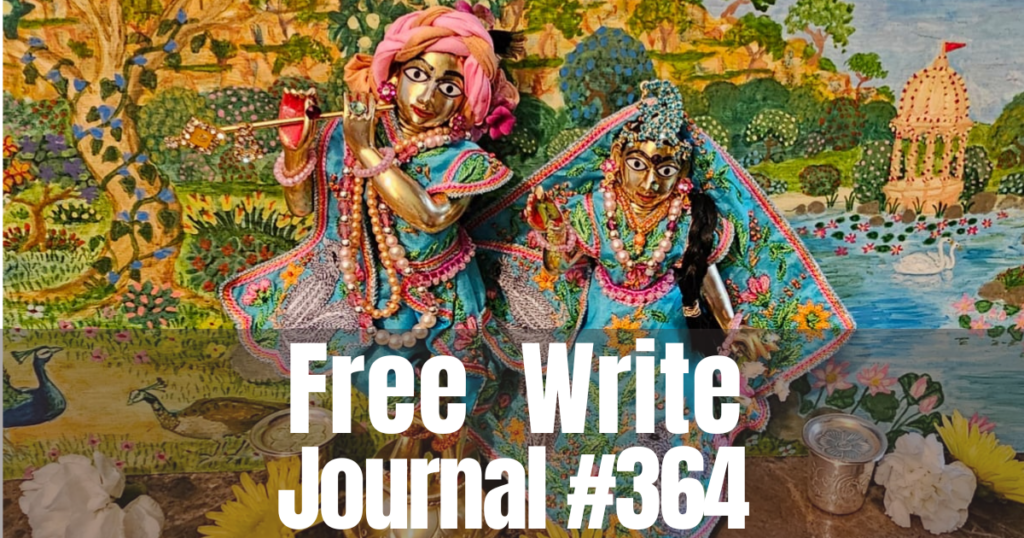
We need to expand our team of proofreaders as we aim to increase the rate of republication of Satsvarūpa Mahārāja’s books as well as new books that he writes.
This includes a need for fluent bilingual Spanish and English speakers to proofread Spanish translations (we currently have around 20 Spanish translations waiting to be proofread).
Anyone interested in this particular service should contact Manohara dāsa at [email protected]
If you would like to help, please contact Kṛṣṇa-bhajana dāsa at [email protected] or [email protected] and we will find you a service that utilizes your talents.
I have already explained why chanting may be so difficult—because it’s so easy. There is nothing to occupy your intelligence and not enough work for the body. It’s all soul, devotion, and if you lack in those areas, then you get bored and sleepy. You think of something else. That’s one explanation.
******
The explanation based on namaparadha is this: You did stuff that shuts you out from God’s mercy. He is deliberately withholding because of your disqualifications. Lord Caitanya states, “My dear Lord, although You bestow such mercy upon the fallen, conditioned souls by liberally teaching Your holy names, I am so unfortunate that I commit offenses while chanting the holy name, and therefore I do not achieve attachment for chanting.” (Cc., Antya 20.16).
******
In Madhurya-kadambini, Visvanatha Cakravarti Thakura quotes the statement that if one hears the holy name once, he is liberated. “One should have no doubt that the holy name has such inestimable power. But the holy name, being unhappy with offenses committed against it, does not manifest His complete power in the offender.” (Chapter 3, p. 5). Visvanatha Cakravarti Thakura compares the state of an offensive chanter to a subordinate who is offensive to a master. He is denied proper care and is treated indifferently by the master. But if he surrenders again to the master, he will receive all care.
******
Visvanatha Cakravarti Thakura: “‘I have not committed any offenses.’ One should not make such statements. One can infer the existence of either recent or long-standing offenses by their effect. The effect of offense is that a person will not manifest any symptoms of prema by performance of nama-kirtana” (Chapter 3, p. 5).
******
In Madhurya-kadambini, repeated chanting is recommended, along with the performance of other bhakti activities. And sometimes the Lord, “in order to increase his humility toward and longing for the Lord, bestows on [the devotee] all sorts of sufferings as His mercy. This suffering is not the effect of sinful actions in previous lives.” (Chapter 3, p. 6)
******
While still in the Caribbean, I felt guilty that the desire to write during the japa retreat would steal energy from the chanting. I don’t think that way now. My writing arm is friendly and willing to help, although it doesn’t seem to help my chanting yet. But it is possible. Just writing down statements from the acaryas helps. The diary is a solace; at least there is a record, a purpose. If I keep on writing more, maybe it will help more.
******
“Just as during a serious fever, losing all taste for food, it becomes impossible to eat, a person who commits a serious offense loses scopes for hearing, chanting, and performing devotional activities. There is no doubt about this. However, if the fever lessens with time, some taste for food develops. Even then, nourishing foods like milk and rice cannot give their full power of nourishment to the person suffering from chronic fever. They bestow some benefit but cannot relieve him of his wasted condition. An invalid’s diet and medicine can, however, with time, restore him to his previous healthy condition. At that time, the full potency of normal food can be utilized by the body” (Madhurya-kadambini, Chapter 3, p. 6).
******
“In the same way, after a long period of suffering the effects of aparadha, the intensity reduces somewhat and the devotee develops a little taste. Again the devotee becomes qualified for bhakti. Repeated doses of hearing and chanting the Lord’s name and performance of other devotional processes, gradually, with time reveal everything up to prema.” (Madhurya-kadambini, Chapter 3, p. 6).
******
“If the namaparadhas, though they be long-standing, have been committed unconsciously (but their presence is inferred by the results, lack of advancement), then one should chant the Name constantly. By that steadiness, bhakti will be attained and gradually the offenses will be neutralized” (Chapter 3, p. 2).
Hare Krsna. In the spiritual world there are four rasas with Krsna. One can be a servant of Krsna, with Krsna as master. One can be a friend of Krsna on equal terms. One can be the parent of Krsna and be supporting Him. And one can be the conjugal lover of Krsna. Each of these persons in the rasas thinks their relationship is best, and they’re satisfied with it. And in the Absolute everything is one, so there’s no higher or lower. But if we examine it impartially, the madhurya-lila is the highest. It has all the qualities of the other relationships. In conjugal love there are two divisions—svakiya and parakiya. Svakiya is a married relationship, like the princesses of Krsna. That’s a domestic relationship, very secure, Krsna is their husband, who expands Himself into 16,108 forms to be the husband of each individual wife. And He stays with her in a palace, and He’s a dutiful husband. And the other relationship is parakiya, unwedded love, where Krsna is the paramour, and He has a love affair with the wife of another man, or an unmarried gopi. In the spiritual world, the parakiya relationship is superior. It has more enthusiasm because of the risks involved. The gopis have to avoid their relatives and get out of the house to meet Krsna, and they get chastised, and they break all religious and moral codes just to be with Krsna. In the material world, the parakiya rasa is abominable, so there’s no such thing. But in the spiritual world, it’s the purest and the highest thing, Krsna and the gopis of Vraja. Lord Caitanya said this is the best way to worship Krsna. And of all the gopis, Srimati Radharani is the best. She’s the most beautiful, She has the best qualities, and especially, She loves Krsna the most. So She’s the best devotee. Today is Her Appearance Day.
Krsna is controlled by Radharani’s love. She is the hladini-sakti, the love-giving potency of Krsna. Krsna has three internal potencies, sandini, samvit potency and the hladini potency. The sandini potency is His existence. And you can say samvit is His knowledge potency, by which He knows Himself. And the hladini potency is His pleasure potency. So Krsna is all-spiritual, He can’t enjoy matter. He enjoys with spiritual. And Radharani is the personification of the hladini potency. She transmits Krsna’s love potency to other devotees. Devotees in Vrndavana pray to Radharani to get the blessings of Krsna. Prabhupada says that if you get the recommendation of Radharani, She recommends you to Krsna: “This devotee is nice,” then your going back to Godhead is guaranteed.
I would like to tell a Radha-Krsna lila story. This one is by Raghunatha dasa Goswami, “Flower Pastimes.”
One time the gopis were picking flowers in Vrndavana and Krsna came upon them. This was an ordinary thing, for them to be picking flowers, but He became very arrogant and bold, and called them thieves. He said, “How dare you steal the flowers in My Vrndavana? You will be punished!”
They said, “Why are You picking on us? Other people are picking flowers, You’re not harassing them, why are You harassing us?”
He said, “This is My forest; I’m the proprietor of this forest and anyone who picks a single flower without My jurisdiction will be punished.” So this began a long debate about the proprietorship of Vrndavana. The gopis said that Vrndavana belonged to Radharani, and Krsna said it belonged to Him. He quoted some places in the Vedas where it is said that Vrndavana is the property of Krsna. And Lalita said, “If Vrndavana is Your property, why is it called ‘Vrndavana’? It’s named after our dear friend, Vrnda!” Vrnda was present in the company there. Vrndadevi is a very special gopi—she arranges the forest for rendezvous of Radha and Krsna with beautiful, natural cottages and flower beds, and makes everything nice for Them. So Vrndavana is named after Vrnda, and Lalita argued she’s the proprietor of Vrndavana. Krsna shot back that, “Vrndadevi is My dear chaste wife, and everyone knows that the husband and wife are one. If you refer to something as belonging to the wife, that includes the husband also.” And Radharani turned to Vrnda and whispered, “Is this true?” (that Vrnda is the wife of Krsna)? And Vrnda got very angry. She turned red, and she insulted Krsna. She said, “You eunuch of Padma!” A eunuch is a sexless man, and Padma is the ally of Candravali, Radharani’s rival. And she called Him a worshiper of Candravali. She said, “You should go to Candravali, flatter her and she will give You a grove of jubjub trees.” Then Vrnda began a long description of Radharani’s beauty, describing each of Her bodily parts in poetic language. So Krsna was defeated in His argument that Vrnda was His wife. But He wasn’t stopped. He criticized all the gopis and said, “You are all crooked, and Radharani shouldn’t associate with you.” He asked Radharani to come with Him to a cottage and leave Her ferocious girlfriends. Then Radharani became angry at Krsna and said, “Stop playing the comedian in the company of these sophisticated girls. Go back to Your boyfriends in Nandisvara and joke with them.” And they went back and forth like this, arguing about the proprietorship, and Krsna demanding that they give up the flowers or He’s going to take their clothes.
When the first initiation came on Janmastami, I hadn’t been following for even two months. I passed it up, but then I felt sorry. The boys who were initiated seemed happy with their red beads, and I felt left out. I did not have a spiritual name. Soon afterward, I overheard someone say that there was going to be another initiation on Radhastami.
Hayagriva asked me, “Are you going to get initiated?”
I said, “I’d like to. I think I’m ready this time. What do I have to do?”
“You should ask Swamiji I guess, to see if it’s all right with him.”
So I went up and said, “Swamiji, I heard there’s going to be another initiation. I would like to be initiated.”
Prabhupada was calm about my request. He was never hasty. He took his time, weighing things deeply, and yet at the same time he seemed casual. He was more at home in New York City than I was, especially in his room, which had become an asrama. When I went into his room, the room of the guru, which was kept so simple and spiritual, I was the self-conscious one and he was perfectly at ease. He was like a lotus sitting on the dirty waters of New York City, floating above it all. And he was all alone; there was no other devotee dressed in dhoti with Vaisnava tilaka—just Prabhupada, alone and chaste to the parampara and to his Guru Maharaja. He was determined. And now some little success had come in starting ISKCON.
I said, “I would like to get initiated.”
Prabhupada replied, “You’ll have to be a strict vegetarian.”
I said, “I already am, Swamiji. I’m already a vegetarian.”
“All right,” he said.
The meeting was over almost as soon as it had begun. I like to claim that we all had access to Prabhupada whenever we wanted, and that’s true. But we always knew that we weren’t his equals or buddies. We did not want to waste his time. But to be able to go personally, even for a brief moment, and have him personally approve my initiation, was worth everything. So I was in and out of his room within a few minutes. He had accepted me!
. . . All I can remember for sure about my initiation is that I was initiated by Prabhupada. Everything else is a detail, although I’d love to be able to remember more of it someday. I do remember being in the room with him and that he chanted on my beads while I waited and watched. When he finished one round, he said, “Come forward” and I crawled forward.
Swamiji said, “Bow down.” I did not do it until he said the words, “bow down.” Then I gave myself to that act, and at his prompting I repeated line for line the Sanskrit words of his pranam-mantra.
Prabhupada said, “Namah om,” and I repeated it, phrase for phrase. When he said the word “bhakti” and I repeated it, that had a special effect on me. I closed my eyes and felt myself plunging into bhakti by saying the word and by saying his name, Bhaktivedanta. The combination of bowing down, reciting the sacred words, and trying to feel surrender brought a perceivable change.
I was initiated along with Bruce, Keith, and Chuck. This was the second initiation in ISKCON, and so all the boys who were first initiated were also in attendance. They sat around fingering their big red beads, which were strung around their necks. It was a good time for them to chant japa and welcome us into the fold on Radharani’s Appearance Day. It was another festival, and Swamiji said he had plans for many festivals, marriages, initiations, and things that we couldn’t even dream of. I knew I had done the right thing by getting initiated and that it was foolish to delay.
I had expected that he would give me a name that began with the letter “S.” I was happy to be given any name as long as it was a real spiritual name, given by Swamiji. As far as we were concerned, all the names were similar—Hayagriva, Kirtanananda, Raya Rama, Satsvarupa. So mine was another one of those Sanskrit names just like the others. It had a good sound and shape to it. I did not know what it meant, but it was one of the spiritual names that Swamiji gave, and it was a real one. I was perfectly satisfied.
Some days later I asked, “What does Satsvarupa mean?”
Swamiji said, “It is the inner form of reality.” His definition was something that I would have to think about; it sounded like something mystical that would be revealed to me later.
Another time I walked into Prabhupada’s room when devotees were gathered. In an affectionate welcome he said, “Here is the truth personified.”
He would often speak like that, playfully using his disciples’ names. He would say, “Oh, here is Jagadisa, the Supreme Controller.” Or, “You are Damodara, who is tied up with Mother Yasoda’s ropes.” This second definition of Satsvarupa was clearer, and I was flattered to think that I possessed the qualities of my name, rather than remembering that I was the servant of those qualities.
The morning after initiation, when I went to the storefront for Swamiji’s class, some of the boys fumbled at first in trying to remember and pronounce my new name.
Hayagriva said, “Do you have that typing done, Steve?—Oh, what is your name anyway?” “Satsvarupa dasa.”
“Satsvarupa. Hmm. What does that mean?”
“I don’t know. I’ll have to ask Swamiji.”
“Satsvarupa!” And so they started to call me by my actual name. Things were different after initiation, and you wanted to feel that difference. Swamiji was there as before, but now you were his disciple.
pp. 413-423
Tomorrow is Radhastami. The program will be long—two mangala-aratis, Deity greeting, guru-puja, a special, long kirtana, class at 8, readings in honor of Srimati Radhika at 9, an abhisekha at 11:30, a noon arati, and a feast. I’ll attend up to the first class and then come back here. I just can’t hold up so long at these programs. We will read from Raghunatha dasa Gosvami’s (Rati-manjari’s) poems about Radha. That is the point of view I want to hear. If you love Radha’s service, you have to give up the world. You have to be ready for waves of bhava because Radha’s life is not peaceful like that of Krsna’s wives. She has to meet the Lord in secret, overcoming dangers and difficulties. On a dark-moon night, She goes out to meet Krsna, led by Rati-manjari, although She can’t even see the path.
Do you want a service that is full of pain when you witness Radhika’s separation from Krsna? Yes, I am praying for this. I am praying to become qualified to serve the Queen of the manjaris in bold, loving service.
Yesterday I quoted a verse by Prabodhananda Sarasvati about feigned ecstatic symptoms. Keep breaking through pretense.
This is the first year I have been fortunate enough to be in Vrndavana on Radhastami. I cannot prove whatever love I have for Her by filling these pages with verses glorifying Her. Nothing artificial.
But I don’t want to be silent or neglectful either. Nothing artificial means no feigned symptoms, no pretense. It doesn’t prove anything about your heart to record verses in this book.
Raghunatha dasa Gosvami laments out of love-in-separation from Radha. He wants to be Her maidservant. If for a moment he loses the vision of Her pastimes, he feels great pain. “O Goddess! This person has died from the bites of the black snake of separation from You. Please revive me with the medicinal lac that is smeared on Your lotus feet!” (Vilapa-kusumanjali, text 9).
When will he get the vision again? When, even in a dream, will She beautify his head by touching it with the dust of Her feet? Each prayer by Raghunatha dasa Gosvami refers to pastimes of Radha and Krsna in which he participated as Rati-manjari.
“Ever since Rupa-manjari filled my eyes with light in the land of Vraja, I have desired to see the red lac on Your lotus feet!” (Vilapa-kusumanjali, text 14).
Let that verse be ours too. Ever since Srila Prabhupada told us about Radha, our eyes have been opened…
She is the best devotee of Lord Krsna because She loves Him the most. And we may serve Her directly by serving Her manjaris. This is the highest goal for devotees of Lord Caitanya. It grants the most intimate service in love of God that is possible for the liberated spirit soul.
All glories to Radha. I pray not to become an offender today. By the grace of my spiritual master, His Divine Grace A.C. Bhaktivedanta Swami Prabhupada, I was initiated into harer-nama on this day twenty-six years ago. May I humbly celebrate my own birthday as well by remembering it within myself and giving thanks. It is an honor to be spiritually born on the appearance day of Srimati Radhika. It gives me the hint that I should be going in the direction of Her service. “O Radhe! When my eyes saw Your pond, which is filled with sweet water, lotus flowers, and beautifully humming bees, I got the desire to taste the nectar of Your service!” (Vilapa-kusumanjali, text 15).
Even when we think of gopi-bhava or read of the gopis’ love for Krsna (as in the Venu-gita), we want to know “Where is Radha? What does She think and feel?” We want to be in tune with Her desires.
She is compassionate to Her devotees. When Raghunatha dasa Gosvami was suffering in separation from Her, soaking the bank of Radha-kunda with his tears, Srimati Radharani appeared before him. With a voice filled with affection She said, “Tulasi! Why do you want to see Me alone?”
Raghunatha replied, “O Svamini! Ever since I met Rupa-manjari who opened my eyes, by Your grace, I have wanted to see the red lac on Your feet.”
The guru opens our eyes to the service of Radha in the spiritual world. We pray to know him in his spiritual form as a maidservant there and to assist him (nikunja-yuno rati-keli-siddhyai). Narottama dasa Thakura prays, “When will my master, Lokanatha Gosvami, take me along and submit me to Sri Rupa-manjari’s lotus feet?”
Tulasi- (Rati-) manjari prays to Radha, “I want to admire the red lac on Your lotus feet when it shines on a blackish background (Syama’s chest). I don’t want to see You by Yourself, but with Your Syama, if He belongs to You.”
So no feigned symptoms today, but try to pray: Hare, Hare, Radhe, Radhe, please engage me in the service of Krsna, Krsna. Hare Hare, O Radha, please take away the dirt, the lust, the old memories. Please take away the obstacles to my seeing You. Please awaken in me the desire to serve my spiritual master (who is Your representative) in this life and the next. Let me be the servant of the servant of the servant of those who serve You at Yavat. Let me hear with a pure heart of the dasis who tend to Radha’s needs, who live to bring about Her meeting with Syama, and who are sad when She is in separation from Him.
Our guru decries the cheap constant taking of the names, “Radhe, Radhe, Radhe.” But on this day, we can all sing Her names with special permission. We pray for a pure heart, and the awareness that the goal is radha-prema.
pp. 6-13
Waves at Puri break on shore
bathers don’t go out far,
shout and jump as waves break waist high
no bold swimmer far out,
ladies in full bathing dress.
I watch it all from the distance of
my room, the waves come in
rows, in white splash,
thunder and shouts of feeble,
happy vacationers.
Waves of Puri break
on my head and heart—
I’m so foolish and demure
and timid (false too).
I hide from between
lines of this verse. Haridasa
Thakura was bathed here
after he died
(he reasons ill who thinks
he died).
The holy ocean,
the taxis waiting now as
we go to see
Haridasa’s tomb and the ocean
never far away. I wait
for the time when I’ll
return peacefully to this
room for a night’s rest
and hear the soothing surf
and wake to it again.
I hear the waves at midnight when
I wake and remove earplugs. It’s
music. I won’t call it drums—
it thuds but reassures,
pacifies. I like it best when
no one is there shouting in
the surf. With first light
they gather and by morning they
are crowded on the winter
beach. Often it’s gray and too
cold to swim and families or
students, in sweaters and
scarves and shawls and cadars
and pants and saris or long dresses
stand at the border beyond the wet
and watch, simply watch
the sea.
Do the waves make sense?
Do they have a message?
“If I want a message,” Uncle Jim
used to say, “I’ll go to Western Union.”
Do the waves rhyme, are
they on time? Yes! And they
don’t come on the
shore more than they are allowed
by the Supreme.
Sometimes—rarely
every one hundred years in some places
He allows the waves to come up
and soak or dismantle
the beachside hotels.
Ha! Then the laugh
is on the capitalists, although poor people
also drown.
The waves pound and don’t stop.
They could kill a man.
I hear them from a timid
distance. I praise their
drumming rolling qualities,
I sing of the hypnotic supreme
the drunkenness of trancewords,
the drum (admit it, it’s
a sort of drum roll), a
roll call of names
of the living and the dead.
“From thence he shall judge
the living and the dead.”
Just here happy with our
group in Nilacala .. .
By 4:30 A.M., long before sunrise, they
are out on the beach. A tea walla sets up a
bench and they sit there facing the
ocean, twenty feet from waves’ edge,
sipping tea in glasses, huddled
in the cold, blankets, jackets
and later walking in larger groups
across the sands, not doing anything,
just walking, and when one sees a
crab they all gather around.
I like their innocent do-
nothingness, the no-ghetto-blaster mood,
the no fighting, no bikinis, no strutting,
and even though their visit is a karmi’s
vacation, they go for darsana of
Lord Jagannatha.
Yeah, tune in, them poundin’
waves, and crows and wallas. “I’ll have
one, please,” a straw basket woven and
in it Jagannatha tongues, pastries, old
sugar-crusted buns, nuts, balls with
salty sweets. You are
a rapacious one
to sing a song of ocean. Maybe
like Yeats you should lie on
a board and get your rhythms
tight and straight.
Tune in. Door shut to keep out slow-flying bugs and mos-quitoes that hide in room corners and in passport pouches and book bags. Ah, my thoughts . . . the mosquitoes warn like gentlemen and I paw them away.
Passing on the street, a guy overheard Madhurya-lila dasi speaking in Hindi. She was saying, “You say I should live here, but they don’t even allow us to enter the temple.” At that moment, the guy passing, a perfect stranger, says cheekily, “Maybe next lifetime.” And the man walking beside her said it might take three yugas of rebirths before any of us can see Lord Jagannatha in the mandira, but if Jagannatha wants, it could happen in three days. Puffed-up Puri pandas and me.
The waves thump and rump
and drum-roll on the beach sand
hard thigh.
Crow chorus picks at pus.
“We thank them,” the ornithologist said,
“for clearing roads of carrion.”
And the drawing of happy faces
with crayons surrounding the form of
Lord Jagannatha. Ubiquitous—He’s on the
motorscooters too.
I like to write and read and talk to myself (who else listens?). I feel like I am putting down another layer of clean lines and sentences whenever I write, like painting.
You know, I’m bored of the old presentations of Krsna consciousness. We say we speak for the newcomers, but I want to hear someone speak from the heart. Not something obnoxious or sentimental. It seems that when we open the floor, people immediately start complaining or talk politics or try to hurt someone with their outpouring of grief. I don’t mind grief, but speak it in a way that it sounds like blues music. Speak everyone’s sadness or make the Krsna conscious element so true and full of yearning and appreciation that we don’t mind the pain. Don’t be a twig that snaps off the Caitanya tree in the wind. Bend, be flexible, and keep going.
Many devotee friends, and even my personal doctor do not seem to comprehend the crippled condition of my left foot. It all began in 1964 when I was 24 years old. Under the influence of LSD, I jumped out of a third-floor window and broke both my heels. I was in casts for six weeks, and when I came out my right foot was healed, but my left foot and ankle were deformed and painful. I was able to walk and even dance, but as the decades passed, my condition gradually worsened. I could no longer take the long morning walks I so much loved. By the beginning of the 21st century I was limping at every step, and my ankle and shin were obviously misshapen. I went to a foot surgeon and asked him if he could splice two of my bones together. He asked me where I had heard of this practice, and I answered vaguely, “From various sources.” The doctor was renowned in his field, and I underwent the operation. He said I might expect an 80% improvement in my foot. There was a long recovery period. I had to wear a black boot and stay in bed for weeks. When I came out of the boot, I felt no relief. I complained to the doctor, and he said he would perform a second operation where he would take out the metal pieces he had inserted in my heel in the first operation. He did this, but there was no improvement. Months went by and I had several more appointments with him. Then one day he told me there would be no more appointments; he had done all he could for me. I was now on my own. I was disappointed that his treatments hadn’t helped me.
After this, I had a physical therapist visit me a few times to teach me exercises to build up the strength in my legs, which had been weakened by so much sedentary life. I am still doing the exercises and they have helped, but I still cannot walk any significant distance. I go outside every other day with Baladeva beside me and I push a four-wheeled walker. I walk slowly for a few yards and stop and rest. Then I walk some more and rest again. I continue this for 15 minutes and that is all I can do. I have no prospects for more improvement beyond this.
That’s why I become impatient and feel misunderstood when I’m pushed: When are you going to Vrndavana and Mayapur dhama in India? Can’t they see I’m unable to even walk across the street? Rama Raya sympathized with me. He said, “You don’t have to go. You’ve gone many, many times to Vrndavana and Mayapur.” The last time I went was 2009. Since then I’ve heard that there has been tremendous expansion in building and an influx of many devotee residents from many countries; in particular, Russia and China. What was once a deserted field—Ramana-reti or the “enchanted sands” where Krsna and the cowherd boys played—is now filled with buildings, including a “Russian house” right near the ancient Krishna-Balarama tree. The monkey population has increased considerably, and they are more aggressive. Of course, the secret spiritual heart of Vrndavana is still present and available to submissive and determined devotees. I am like one of those persons who Maya keeps away by a mayic covering, because they are not really sincere. That is why I keep my ashram as Viraha Bhavan – separation from Vrndavana. We have many arca-vigrahas downstairs and upstairs to keep the place like a mandhir or bhajana kutir. Rama Raya said, “Where you are, that is Vrndavana.” I sit in my chair like a sentinel and keep a darsana of Radha-Govinda, Lord Caitanya and Srila Prabhupada. Downstairs, the first plates of the offering are made to the large Gaura-Nitai and then brought up for the Deities here. It is service in separation, but isn’t that the highest form of bhakti?
pp. 52-57
Srila Prabhupada affirms that Krsna is ready to supply all of life’s necessities, provided a Vaisnava follows the principles set forth by the spiritual master. But Srila Prabhupada warns devotees not to take advantage of Krsna, or of the pious public, and lead a lazy life, seeking support in the name of religion. Prabhupada writes, “A temple should not be a place to eat and sleep. A temple manager should be very careful about these things” (Cc. Madhya 24.266, purport). This advice applies both to married persons (grhasthas) as well as those in the renounced order (sannyasis). Whether one chooses to maintain himself by business earnings or to live as a mendicant and accept alms, all are ultimately dependent on Krsna, and all devotees should fully engage themselves in some sort of devotional service. In the case of Mrgari, he gave up hunting and became a full-time chanter of the holy name. Although Narada assured him that he would send sufficient food, he also advised the hunter “to accept only what is absolutely necessary for him and his wife. The devotee should always be alert to consume only those things that he actually requires and not create unnecessary needs” (Cc. Madhya, 24.262, purport).
It is not fair to interpret the story of Mrgari the hunter as an example of a productive worker who later became a lazy parasite. Neither are the verses and purports intended as criticism toward grhasthas who earn incomes and live outside temples. Everyone should know that our maintenance in life depends on Krsna, and everyone should chant His holy names as much as possible.
Narada-krpa Prabhu declares that he is chanting in the nama-bhasa, or clearing stage. One may take this as a humble statement, or one may be doubtful how a chanter who has not reached suddha-nama, or chanting in pure love of God, can be a spiritual advisor. As Narada-krpa states, even a beginner attains the presence of Krsna in His holy name. One may still be struggling to control one’s mind, and therefore sometimes guilty of inattention, an offense in chanting. But if one goes on chanting wholeheartedly despite his faults, then his “struggle” is glorious. Everyone can learn from such a staunch example.
And who can argue against the genuine realization of Narada-krpa: “I am eager to go on chanting and experiencing the further stages. But basically I chant under the order of my Guru Maharaja, Narada, and I am happy for the first time in my life”? Narada-krpa demonstrates his faith in the holy name by repeatedly advising his new friend, Visnu-rata, that the formidable obstacles on his path, such as opposition from his father, will be cleared up by the Supreme Lord’s intervention—if Visnu-rata simply persists in chanting.
We previously mentioned that the first meeting of a sincere disciple and his eternal spiritual master is like a timeless love story that has been told and retold in many personal histories, and which never fails to inspire serious transcendentalists. The story of troubles encountered by new devotees whose parents are opposed to Krsna consciousness is also an old story and has occurred throughout the centuries in many cultures and religions of the world. It is not an absolute principle that all parents will be opposed, or that the young disciple should meet that opposition by disobedience to parental orders. But a new devotee should at least be assured that he is not the first person in history to face this trouble. Many have faced the test and passed it. But it requires patience, tact, compassion, and strong determination as each person faces the test for himself or herself.
The policeman of Visnu-rata’s village advises the young man that all occupations are valid. His statement that any profession may have imperfections, just as fire sometimes has smoke, is a parallel of Lord Krsna’s teachings in Bhagavad-gita. But Lord Krsna does not say that even forbidden works should be pursued despite their imperfections. If one is engaged in ugra-karma, sinful work, especially work that causes unnecessary pain and death to others, then that work cannot be justified on the principle that “there is always some fault in every endeavor, but don’t renounce it.” The desperate work of the asuras is condemned in the sixteenth chapter of Bhagavad-gita.
Narada even makes a distinction between hunting animals, which he considers a “slight offense,” and the torture of the animals in leaving them half-dead, which he strongly deplores. Narada says, “I beg you from this day on that you will kill animals completely and not leave them half-dead.” Similarly, there is a distinction between a hunter of olden days who went out into the woods and killed animals for his maintenance, and the modern-day slaughterhouse. Both the olden day hunter and the modern-day slaughterhouse operators must face punishment for their deeds, but the wholesale production line slaughtering is much worse.
Although the hunter Mrgari was uncivilized, he still had to suffer the results of his sinful activities. However, if a civilized man kills animals regularly in a slaughterhouse to maintain his so-called civilization, using scientific methods and machines to kill animals, one cannot even estimate the suffering awaiting him. (Cc. Madhya 24. 249, purport)
pp. 55-58
A pure devotee knows the spiritual body of the spiritual Lord. He calls out in separation. In the highest stages his love is transformed from self-centered to Krsna-centered, and he shivers and cries in ecstasy. None of this is related to sexual passion.
Before a devotee can reach that stage, he has to subdue lust, anger, and fear. He holds them in. Or he uses them in Krsna’s service. Narottama dasa Thakura said that he would use lust, anger, greed, and fear in his spiritual life. There’s nothing higher than pleasing Krsna.
When Lord Caitanya walked through the Vrndavana forests the cows followed Him and licked His body. He felt waves of ecstatic love because He is the original Krsna and the cows remembered Him. The cowherd men could not keep the cows from following Lord Caitanya. The deer came too. This is a brief description of His Vrndavana visit, but I am so low and fallen that it doesn’t seem to be softening my heart. I think of Narottama dasa Thakura’s line where he says that even the stones melt when they hear Lord Caitanya’s pastimes. My heart is harder than stone. Therefore, his words were spoken for me. When Lord Caitanya walked in the forest, the cows followed Him. Chant to understand.
Troubled. Read Cc., but have too much on my mind to pay close attention. I’m thinking about the letter from the monk who said he wanted to give up his celibacy to recognize his homosexuality as a valid, human, spiritual expression. The monk’s letter reminds me how disappointed I become when people give up their vows. Just because you feel an urge to do something doesn’t mean you should do it. This correspondent mentioned the “weaker brother”—an expression referring to the stronger brother’s duty not to set a poor example for those who are weaker. Then he said he had a right to live his own life. He can’t live forever as an example to others if it’s not honest.
That reminds me of my pada-yatra theme. It’s a description of endurance despite blisters, other drives, occasional forgetfulness of the goal. When I doubt the point of this writing, I think endurance.
In her book Pictures of Childhood, Alice Miller writes:
Franz Kafka once noted in his diary that a writer must cling to his desk “by his teeth” in order to avoid the madness that would overtake him if he stopped writing. I suppose the same could be said of every creative activity that somehow permits us to come to grips with the demons of our past, to give form to the chaos within us, and thereby to master our anxiety.
Miller said she began to deal with her own anxiety by drawing. She found that writing didn’t actually help her contact her anxiety, so she tried drawing. She was able to connect with her inner child, the seat of her anxiety, by drawing, but she found that her inner child lacked the language to express the pain. Therefore, she allowed the child to speak through the colors.
In my writing, I too seek healing. I don’t want to become another disenfranchised monk, thinking I have outgrown my vows. The “weaker brothers and sisters” are my disciples and they are real people. I too am a weaker son who needs to follow his guru—weaker, because I’m always in need of revitalization. I find it in self-honesty.
I want to pray as I write. Prayer does not mean only restating sastric maxims. Rather, it requires that we focus on our purpose when we pray. Prayer is not a journey of the imagination but of the heart. There’s no point pretending. The prayer journey has to be real and it has to be personal…. I find my language not so much through writing itself but through improvisation. I continually search for and find what’s new in myself by experimenting and playing with the old. I give myself over to the understanding of the moment because it seems to follow its own laws and to elude supervision or censorship. As soon as I attempt to give it direction, to reflect, to work more slowly, I interfere with my own process of discovery and my progress is impeded. The end result may look technically proficient, but I find it boring because it does not speak my deepest language.
We are often imprisoned in the cage of our own abilities and routines. We think routine equals security. If we are to find our own language, we need to break free again and again. Otherwise, our articulation will not remain constantly real and personal. It will not remain prayer.
I don’t know what all this means to me in practical terms. I seem to think I can only take small steps at any one time. I play with words, “raid the inarticulate” when I write, and become more and more willing to express pain if that’s what’s needed.
pp. 62-65
Did a dream send you a grand concept of a metaphor you could fit everything into? An inkling of it or a piece of it? No. But I did discuss it last night with my friend. He said for himself an all-encompassing theme has been that of identity. He used to be very much absorbed in being a football fan. Then he became an Irish Republican. Then he was a punk singer. He was a father and husband, a truck driver. These things didn’t all fit neatly together but seemed contradictory. He saw other people accepting identities and saw that they were play-acting. He didn’t want to do that. But he couldn’t find for sure who he was.
I remember this especially from the 1960s. It was a popular way of expressing yourself. We spoke of someone having an identity crisis. More mature or cynical people would make fun of idealists who are still asking themselves, “Who am I?” Young intellectuals would ride the subways or sit in espresso cafes and ask, “Who am I? What is the universe, and where are we going? What will happen after death?” Others made fun of this and they quickly supplied empirical answers to these metaphysical questions and made a joke out of it. “Who are you? You are Joe Jones, and you are going from the science building to the cafeteria, and you are hungry.”
My friend said, “Of course, just because identity is important to you doesn’t mean that you can take it up as a metaphor for your life in writing.” Then I told him about my resistance to writing fiction—because it’s a lie. He countered this and said, “How do you know that your truth of non-fiction writing, just whatever you feel—how do you know that this is more true? Say you write, ‘Nature is beautiful.’ Well, is that true? Nature is actually cruel. So you have to examine this question and not dismiss fiction as a lie any more that non-fiction.” I then admitted the real reason I didn’t write fiction is because, “I can’t get into it.” Why is that? Maybe it’s too hard to write. At least I feel that there’s more realness when you write immediately from your everyday moment-to-moment identity and experience. That may not be the Truth, but at least it’s not deliberately a construction of a character from your imagination. You don’t play God, you don’t make up life-plots. You just write what is going on and what you feel.
I paused and told my friend, “Improvisation is very important for me.” He laughed and said, “You should have been a jazz musician.” I was a little put off by his light tone on that. Improvisation, even jazz, seems a serious thing. Maybe I’m just more serious about it because the whole thing is weighing on me. It’s not just something that I talk about for a few minutes. Jazz is just an example I give because everyone knows it means improvisation. The real thing is not jazz music, but the act of writing in the way that you don’t prepare. You write what comes. It is somewhat out of your control. If jazz music is like that, then fine. But this is another kind of music, silent, on the page, the life of words or maybe imagination as it comes out.
And all these—metaphor, identity, improvisation—they all have to do with the creative process. Essentially, I write about writing. That’s my main topic. So why not make a metaphor out of it and make it your own kind of story? Well, no. We have to go a step further. What is even more important than creative writing?
Even more important than my evolution as an artist-preacher is my need to practice Krsna consciousness, to obey guru and the Lord and satisfy them. There are direct methods for this and you must ask yourself if your writing is accomplishing this. Is it Krsna conscious? Is it pleasing to guru and Krsna?
Return to the quest for direct Krsna consciousness. That means you simply tell what you are reading. You are like a man who speaks to his children after reading and putting down the newspaper. They could read it themselves, but maybe they don’t have the time. They appreciate his little insights when he says it in a simple way. They trust him. Information theory means what was lost in transmission. Say it is a radio. So they want to know what got lost because of static. But the theorists don’t discuss what is the actual information. Sadaputa, our brilliant Krsna conscious scientist, was discussing this, and I regurgitate it here. He said in Krsna consciousness, we say that information comes from the Supreme Personality of Godhead. That is a consistent and satisfying way to explain it. To get information, you also have to hear from a person. In that case, the Absolute Truth comes from a person in disciplic succession. His qualification is that he is truthful. He doesn’t change the original message. Also, your qualification in hearing is to receive it with trust. If you don’t trust him, then even if he speaks the truth, you cannot take it.
pp. 68-72
I woke up around 9 P.M. and had some insights that were important to me:
One answer to your worries about a diary is that a diary is not the real point. What you are trying to write is a bruise, a universal expression of a bruise among all the different ISKCON complaints and my complaints, my heartbrokenness. The old way that we used to avoid directly addressing the issues because they can’t be said, in talks about the pain of living, of being, because people disagree on these issues, I myself, through the music and the painting, can express these feelings. That becomes an art. Therefore, art is not the superficial or unnecessary luxury people think it is, but it is a crucial way to live and express pain and joy. Yes, and religion too.
The etiquette drives you a little mad. But don’t take false privileges being a white-bodied Western guy who talks straight. Don’t think you are better than Indians! Than brahmanas! Than those who are clean and go on the altar to worship according to stroke rules and regulations of ISKCON arcana-paddhati.
That man, dat man, he
ain’t me, he’s a kind
of Henry, falls conk
asleep from his med,
got a servant guides
him from falling into
a ditch, I repeat that
ain’t me that’s Henry
Hemanta
in his suitcase reluctant.
Goodbye they say to him we
don’t know when we will
meet your grace again so,
give us your blessings
where is a plain friend, a
buddy you could trust?
He wouldn’t turn you in,
wouldn’t mind that you
nodded asleep?
Ladies and gents
we have good news – the
arts blues festival is starting
again
the cry for humanity
the creative –
I can’t say it
But I feel some attempt
will be made on behalf of
all to express
what we want
what we wanted
what has failed
And not abandoning
my Lord.
Don’t you mock him even in your mind (or prose). He worked hard all his life and last lives to become a direct disciple of the saint and to get that red thicker pillow to sit on. Those who are disciples of the saint get thinner pillows to sit on. But they worked hard too. And the mercy of the saint goes direct to all.
Due to leave in about twenty-five minutes. Is something tricking me? You could read some letters and make margin notes in red pen – “Tell her this no way to talk to her guru.” Go fly a kite. That’s not a nice way for a guru to reply. Talk a long walk off a short aircraft carrier.
Solemn pledge, peaceful. I’ll live forever, he thinks. Dear Lord.
I told my assistant, Melodeon, that I planned to resume the old schedule where I rose from bed at 1 A.M. (not 12 A.M. as I used to.) He advised against it. Thinks sleep is important. At least for now, he says, you are still trying to find the balance with the meds and the extra sleep and you can see by this week in Italy you are not so fit…
But I want to read his books in the special quality time. Isn’t it worth a risk? Be patient, try at some other time. The sacred books.
Carrying a lunch in tinfoil
for eating on the plane,
mataji Citra-rupini
is kind to us.
I write this while a power saw saunters through
pieces of wood nearby.
He’s relaxing next door.
Special sadhu presence
sail on darsana
blasphemers banished night
shades, on what basis
do you free-write?
Because I want to fit those
words into the slot, like
coins and get through just
right
any combination will do
haribol, Hare Krsna
no hard and fast
Krsna’s
allowed
Zip up last bags and get ready to drive (ride in the back seat of the car with a pillow). By God’s mercy you can get there and not be stopped. Don’t worry. Everything is included, belongs.
Low. Come up. Sitting in Milano airport, making red marks in the margin of letters. Not so hard to deal with. Humbly he said, go to the new temple. We will arrange to get you Radha-Krsna Deities.
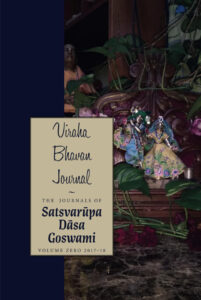
Viraha Bhavan Journal (2017–2018) was written by Satsvarūpa Mahārāja following a brief hiatus in writing activity, and was originally intended to be volume 1 in a series of published journals. However, following its completion and publication, Mahārāja again stopped writing books, subsequently focusing only on what became his current online journal, which began in August of 2018.
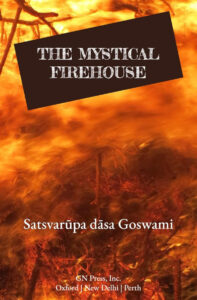
At first, I took it hard that I would have to live surrounded by the firemen, and without my own solitude. After all, for decades I had lived in my own house with my own books and my own friends. I was also now a crippled person who couldn’t walk, living among men who did active duties. But when Baladeva explained it to me, how it was not so bad living continually with other firemen and living in the firehouse with its limited facilities, I came to partially accept it and to accept the other men. I came to accept my new situation. I would live continually in the firehouse and mostly not go outside. I would not lead such a solitary life but associate with the other firemen.
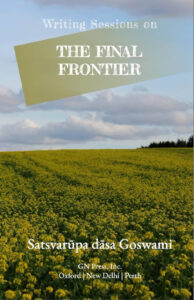
Let me write sweet prose.
Let me write not for my own benefit
but for the pleasure of Their Lordships.
Let me please Kṛṣṇa,
that’s my only wish.
May Kṛṣṇa be pleased with me,
that’s my only hope and desire.
May Kṛṣṇa give me His blessings:
Kṛṣṇa Kṛṣṇa Kṛṣṇa Kṛṣṇa Kṛṣṇa he
Rāma Rāghava Rāma Rāghava
Rāma Rāghava rakṣa mām.
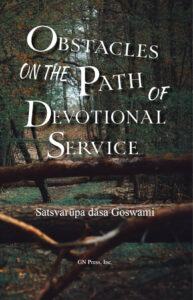
You mentioned that your pathway has become filled with stumbling blocks, but there are no stumbling blocks. I can kick out all those stumbling blocks immediately, provided you accept my guidance. With one stroke of my kick, I can kick out all stumbling blocks. —Letter by Śrīla Prabhupāda, December 9, 1972.
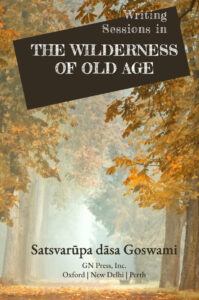
The Writing Sessions are my heart and soul. I’m trying my best to keep up with them. I am working with a few devotees, and they are far ahead of me. I wander in the wilderness of old age. I make my Writing Sessions as best I can. Every day I try to come up with a new subject. Today I am thinking of my parents. But I don’t think of them deeply. They are long gone from my life. Śrīla Prabhupāda wrote a poem when he was a sannyāsī, and he said now all my friends and relatives are gone. They are just a list of names now. I am like that too. I am a sannyāsī with a few friends. I love the books of Śrīla Prabhupāda. I try to keep up with them. I read as much as I can and then listen to his bhajanas.
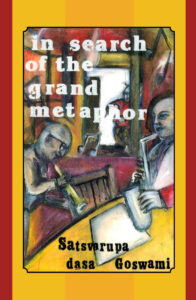
The metaphor is song. Explain it. Yes, particulars may not seem interesting or profound to readers who want structured books.
Wait a minute. Don’t pander to readers or concepts of Art. But Kṛṣṇa conscious criteria are important and must be followed. So, if your little splayed-out life-thoughts are all Kṛṣṇa conscious, then it’s no problem.
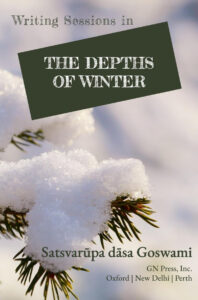
I am near the end of my days. But I do like the company of like-minded souls, especially those who are Kṛṣṇa conscious. Yes! I am prone to Kṛṣṇa consciousness. I have been a disciple of Bhaktivedanta Swami Prabhupāda for maybe almost sixty years. Sometimes I fail him. But I always bounce back and fall at his feet. It is a terrible thing that I sometimes do not have the highest love for him. It is a terrible thing. Actually, however, I never fall away from him. He always comes and catches me and brings me back to his loving arms.

This edition of Satsvarūpa dāsa Goswami’s 1996 timed book, Upstate: Room to Write, is published as part of a legacy project to restore Satsvarūpa Mahārāja’s writings to ‘in print’ status and make them globally available for current and future readers.
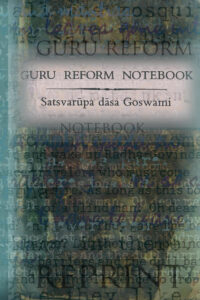
A factual record of the reform and change in ISKCON guru system of mid ’80s.
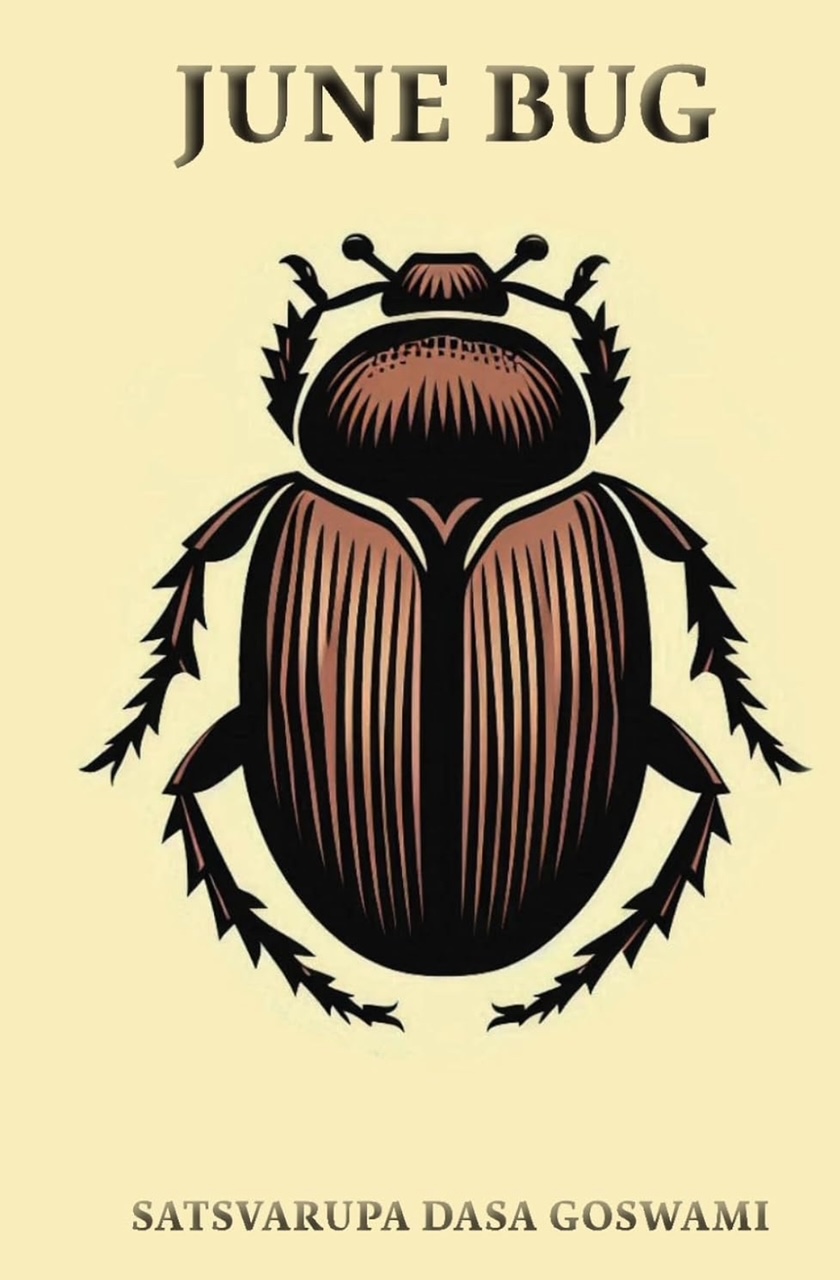
Readers will find, in the Appendix of this book, scans of a cover letter written by Satsvarūpa Mahārāja to the GN Press typist at the time, along with some of the original handwritten pages of June Bug. Together, these help to illustrate the process used by Mahārāja when writing his books during this period. These were timed books, in the sense that a distinct time period was allotted for the writing, during SDG’s travels as a visiting sannyāsī
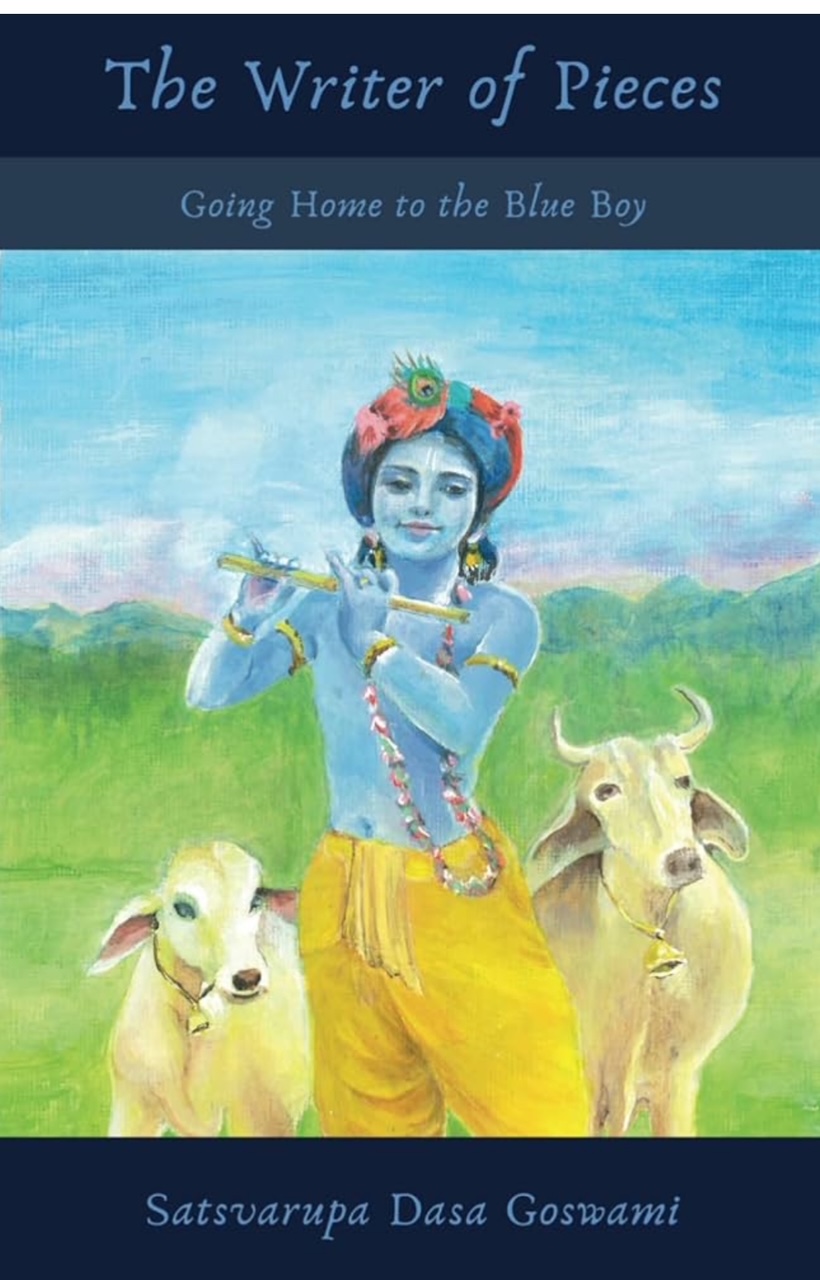
Don’t take my pieces away from me. I need them dearly. My pieces are my prayers to Kṛṣṇa. He wants me to have them, this is my way to love Him. Never take my pieces away.
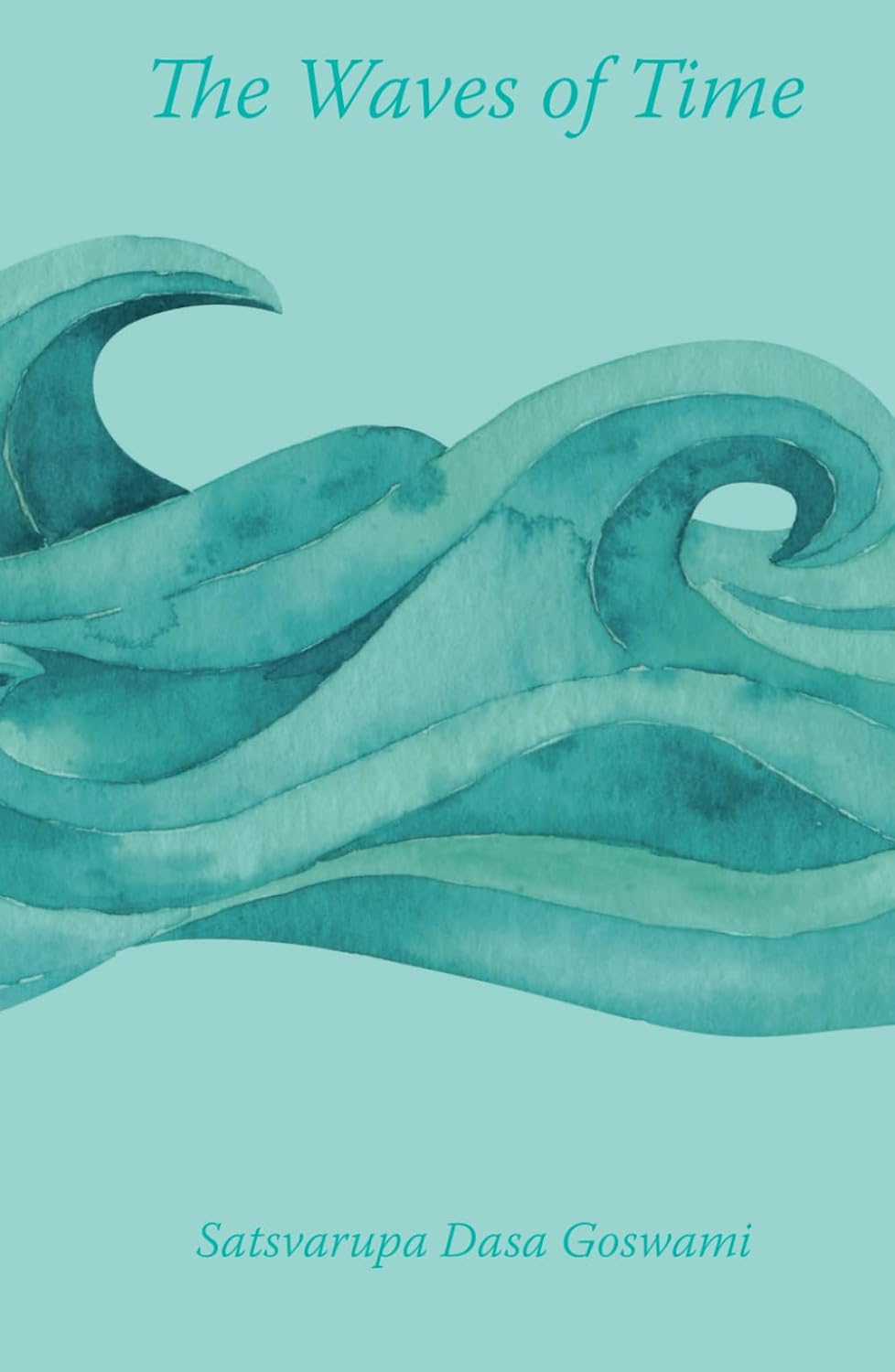
Many planks and sticks, unable to stay together, are carried away by the force of a river’s waves. Similarly, although we are intimately related with friends and family members, we are unable to stay together because of our varied past deeds and the waves of time.

To Śrīla Prabhupāda, who encouraged his devotees (including me) To write articles and books about Kṛṣṇa Consciousness.
I wrote him personally and asked if it was alright for his disciples to write books, Since he, our spiritual master, was already doing that. He wrote back and said that it was certainly alright For us to produce books.

I have a personal story to tell. It is a about a time (January–July 1974) I spent as a personal servant and secretary of my spiritual master, His Divine Grace A.C. Bhaktivedanta Swami Prabhupäda, founder-äcärya of the International Society for Krishna Consciousness. Although I have written extensively about Çréla Prabhupäda, I’ve hesitated to give this account, for fear it would expose me as a poor disciple. But now I’m going ahead, confident that the truth will purify both my readers and myself.

First published by The Gītā-nāgarī Press/GN Press in serialized form in the magazine Among Friends between 1996 and 2001, Best Use of a Bad Bargain is collected here for the first time in this new edition. This volume also contains essays written by Satsvarūpa dāsa Goswami for the occasional periodical, Hope This Meets You in Good Health, between 1994 and 2002, published by the ISKCON Health and Welfare Ministry.

This book has two purposes: to arouse our transcendental feelings of separation from a great personality, Śrīla Prabhupāda, and to encourage all sincere seekers of the Absolute Truth to go forward like an army under the banner of His Divine Grace A.C. Bhaktivedanta Swami Prabhupāda and the Kṛṣṇa consciousness movement.

A single volume collection of the Nimai novels.

Śrīla Prabhupāda was in the disciplic succession from the Brahmā-Mādhva-Gauḍīya sampradāya, the Vaiṣṇavas who advocate pure devotion to God and who understand Kṛṣṇa as the Supreme Personality of Godhead. He always described himself as simply a messenger who carried the paramparā teachings of his spiritual master and Lord Kṛṣṇa.

Dear Srila Prabhupada,
Please accept this or it’s worse than useless.
You have given me spiritual life
and so my time is yours.
You want me to be happy in Krishna consciousness
You want me to spread Krishna consciousness,

This collection of Satsvarūpa dāsa Goswami’s writings is comprised of essays that were originally published in Back to Godhead magazine between 1966 and 1978, and compiled in 1979 by Gita Nagari Press as the volume A Handbook for Kṛṣṇa Consciousness.

This second volume of Satsvarūpa dāsa Goswami’s Back to Godhead essays encompasses the last 11 years of his 20-year tenure as Editor-in-Chief of Back to Godhead magazine. The essays in this book consist mostly of SDG’s ‘Notes from the Editor’ column, which was typically featured towards the end of each issue starting in 1978 and running until Mahārāja retired from his duties as editor in 1989.

This collection of Satsvarupa dasa Goswami’s writings is comprised of essays that were originally published in Back to Godhead magazine between 1991 and 2002, picking up where Volume 2 leaves off. The volume is supplemented by essays about devotional service from issues of Satsvarupa dasa Goswami’s magazine, Among Friends, published in the 1990s.

“This is a different kind of book, written in my old age, observing Kṛṣṇa consciousness and assessing myself. I believe it fits under the category of ‘Literature in pursuance of the Vedic version.’ It is autobiography, from a Western-raised man, who has been transformed into a devotee of Kṛṣṇa by Śrīla Prabhupāda.”
 The Best I Could Do
The Best I Could DoI want to study this evolution of my art, my writing. I want to see what changed from the book In Search of the Grand Metaphor to the next book, The Last Days of the Year.
 a Hare Krishna Man
a Hare Krishna ManIt’s world enlightenment day
And devotees are giving out books
By milk of kindness, read one page
And your life can become perfect.
 Calling Out to Srila Prabhupada: Poems and Prayers
Calling Out to Srila Prabhupada: Poems and PrayersO Prabhupāda, whose purports are wonderfully clear, having been gathered from what was taught by the previous ācāryas and made all new; O Prabhupāda, who is always sober to expose the material illusion and blissful in knowledge of Kṛṣṇa, may we carefully read your Bhaktivedanta purports.

I use free-writing in my devotional service as part of my sādhana. It is a way for me to enter those realms of myself where only honesty matters; free-writing enables me to reach deeper levels of realization by my repeated attempt to “tell the truth quickly.” Free-writing takes me past polished prose. It takes me past literary effect. It takes me past the need to present something and allows me to just get down and say it. From the viewpoint of a writer, this dropping of all pretense is desirable.
 Geaglum Free Write
Geaglum Free WriteThis edition of Satsvarūpa dāsa Goswami’s 1996 timed book, Geaglum Free Write Diary, is published as part of a legacy project to restore Satsvarūpa Mahārāja’s writings to ‘in print’ status and make them globally available for current and future readers.